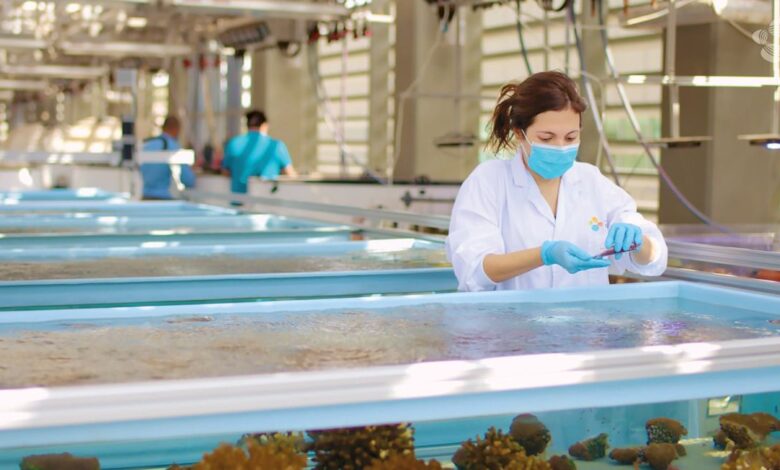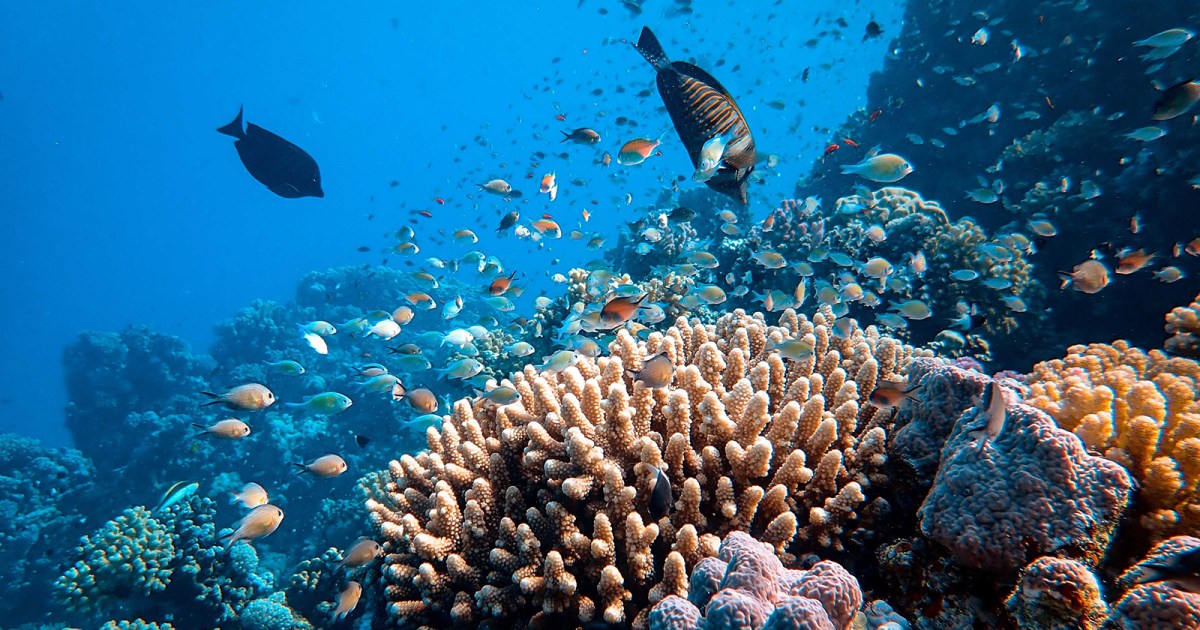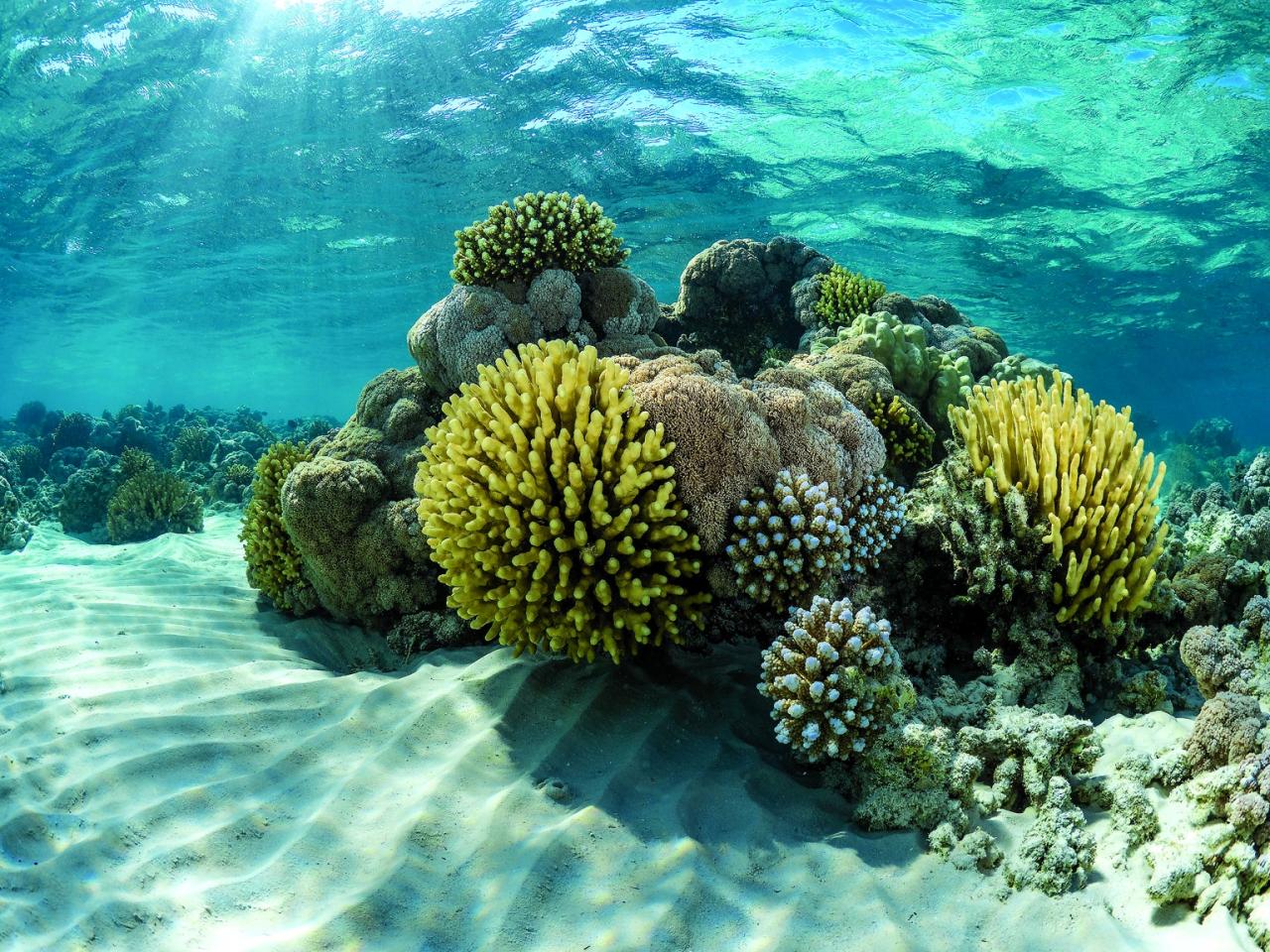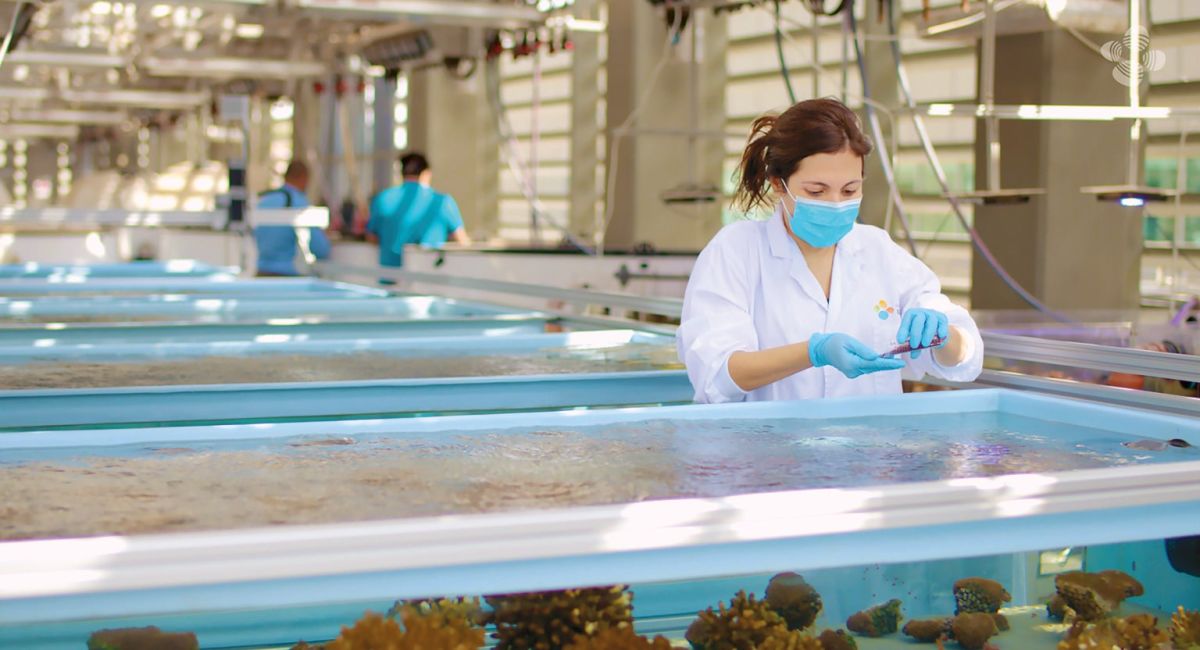
Probiotics Could Help Save Overheated Coral
Probiotics could help save overheated coral, a glimmer of hope in the face of a global crisis. Coral reefs, vibrant underwater cities teeming with life, are facing a dire threat: rising ocean temperatures. These temperature spikes, often leading to coral bleaching and death, are decimating these vital ecosystems.
But what if there was a way to bolster coral resilience, to help them withstand the heat and survive? Enter the world of probiotics, beneficial bacteria that could potentially revolutionize coral conservation.
The intricate relationship between coral and bacteria is a fascinating story in itself. Just like the human gut, coral hosts a diverse community of microbes, known as the coral microbiome. These bacteria play crucial roles in coral health, influencing everything from nutrient uptake to disease resistance.
The idea is that by introducing beneficial bacteria, probiotics could tip the scales in favor of a healthy microbiome, enabling coral to better cope with environmental stressors like heat and pollution.
The Coral Reef Crisis

Coral reefs, often referred to as the “rainforests of the sea,” are facing a dire crisis. The vibrant ecosystems that once thrived in tropical waters are now struggling to survive due to a combination of environmental stressors, primarily driven by human activities.
Coral Bleaching and Contributing Factors
Coral bleaching, a phenomenon where corals lose their vibrant colors and turn white, is a major indicator of reef health decline. This occurs when corals expel the symbiotic algae (zooxanthellae) that live within their tissues and provide them with food and color.
The primary cause of coral bleaching is rising ocean temperatures due to climate change. Other contributing factors include:
- Ocean Acidification:As the ocean absorbs carbon dioxide from the atmosphere, it becomes more acidic, making it difficult for corals to build their calcium carbonate skeletons.
- Pollution:Runoff from agricultural activities, sewage, and industrial waste introduces harmful pollutants into the ocean, stressing corals and hindering their growth.
- Overfishing:The removal of herbivorous fish, which control algae growth, can lead to an overgrowth of algae that smother corals and prevent them from thriving.
- Destructive Fishing Practices:Methods like blast fishing and cyanide fishing damage coral reefs and disrupt the delicate balance of marine ecosystems.
Ecological and Economic Importance of Coral Reefs
Coral reefs are crucial to the health of the ocean and the well-being of coastal communities. They provide:
- Habitat and Food Source:Coral reefs provide shelter and food for a diverse array of marine life, including fish, invertebrates, and sea turtles. This biodiversity contributes to the overall health of the ocean ecosystem.
- Coastal Protection:Coral reefs act as natural barriers that protect coastlines from erosion and storm surge, reducing the risk of flooding and damage to coastal infrastructure.
- Tourism and Recreation:Coral reefs are a major attraction for divers, snorkelers, and tourists, generating significant economic revenue for coastal communities. The loss of coral reefs can have a devastating impact on tourism and local economies.
- Medicine and Biotechnology:Coral reefs are a source of bioactive compounds with potential applications in medicine and biotechnology. These compounds have the potential to lead to new drugs and treatments for diseases.
Rate of Coral Reef Decline and Potential Consequences, Probiotics could help save overheated coral
The rate of coral reef decline is alarming. According to the Global Coral Reef Monitoring Network, over 50% of the world’s coral reefs have been lost in the past 30 years. The loss of coral reefs has far-reaching consequences:
- Biodiversity Loss:The decline of coral reefs leads to a significant loss of marine biodiversity, impacting the entire food web and the balance of ocean ecosystems.
- Coastal Erosion and Flooding:The loss of coral reefs increases the vulnerability of coastlines to erosion and flooding, putting coastal communities at greater risk.
- Economic Impacts:The decline of coral reefs has a significant economic impact on tourism, fisheries, and coastal communities, leading to job losses and reduced income.
- Food Security:The loss of coral reefs can disrupt fish populations, impacting food security for millions of people who rely on fish as a primary source of protein.
Probiotics and Coral Health
Coral reefs are incredibly diverse ecosystems, teeming with life and playing a vital role in the health of our oceans. But these underwater wonders are facing a multitude of threats, including climate change, pollution, and disease. One promising avenue for coral reef restoration is the use of probiotics.Probiotics are live microorganisms that, when consumed in adequate amounts, provide health benefits to the host.
In the context of coral reefs, probiotics could help restore the balance of the coral microbiome, which is the community of bacteria, fungi, viruses, and other microorganisms that live on and within coral tissues.
The Coral Microbiome and its Impact on Coral Health
The coral microbiome is essential for coral health. Beneficial bacteria play a crucial role in nutrient cycling, defense against pathogens, and even coral growth and reproduction. However, the delicate balance of the coral microbiome can be disrupted by environmental stressors, leading to an increase in harmful bacteria and a decline in coral health.
It’s amazing how nature finds solutions, like the potential of probiotics to help coral reefs withstand rising temperatures. While we’re focused on global issues like the analysis to hobble Putin and accelerate the brain drain , it’s crucial to remember the interconnectedness of our planet.
Researching ways to protect coral reefs, even with something as simple as probiotics, could be a key step in safeguarding our oceans and the entire ecosystem.
Potential Benefits of Probiotics for Coral
Probiotics could potentially benefit coral by:* Promoting beneficial bacteria:Introducing probiotics to the coral microbiome could help increase the abundance of beneficial bacteria, which can outcompete harmful bacteria for resources and space.
It’s fascinating to think about how probiotics, those tiny beneficial bacteria, could help save our coral reefs from the effects of climate change. But as we explore these solutions, it’s also important to consider the broader implications of privacy and data security, especially in light of recent legal changes.
For example, the overturning of Roe v Wade has raised concerns about the safety of period tracking apps, as discussed in this article: roe v wade are period tracking apps still safe to use in the us. These are complex issues, and finding solutions for our coral reefs will require a multi-faceted approach, including ensuring the responsible use and protection of personal data.
Suppressing harmful bacteria
Some probiotic strains produce antimicrobial compounds that can inhibit the growth of harmful bacteria, helping to protect coral from disease.
Improving coral resilience
Probiotics could potentially enhance coral resilience to environmental stressors like heat stress, pollution, and disease.
Examples of Probiotic Strains for Coral
Several probiotic strains have shown promise in laboratory and field studies:* Bacillus spp.:This genus of bacteria has been shown to promote coral growth and reduce the incidence of coral disease.
Vibrio spp.
Some strains of Vibrio bacteria are known to be beneficial to coral, while others are harmful. Probiotic strains of Vibrio could potentially outcompete harmful strains.
Pseudoalteromonas spp.
This genus of bacteria has been shown to produce antimicrobial compounds that can inhibit the growth of coral pathogens.
Probiotics are a promising tool for coral reef restoration, but more research is needed to understand their long-term effects and optimize their application.
Mechanisms of Probiotic Action
The potential of probiotics to improve coral health is intriguing, but how do these beneficial microbes actually work? The mechanisms behind probiotic action are multifaceted, involving a complex interplay of interactions between the probiotics, the coral host, and the surrounding environment.
Coral Stress Resistance
Probiotics can contribute to coral resilience against heat stress and disease by influencing various physiological processes.
- Enhanced Immune Response:Probiotics can stimulate the coral’s immune system by triggering the production of antimicrobial compounds and immune cells. This enhanced immune response helps corals fight off pathogens and infections, reducing the risk of disease outbreaks.
- Competition for Resources:Probiotic bacteria can compete with harmful microbes for nutrients and space, limiting the growth and spread of disease-causing organisms. This competitive exclusion helps maintain a healthy microbial balance on the coral surface.
- Stress Mitigation:Probiotics may also help corals cope with heat stress by producing compounds that protect against oxidative damage and enhance cellular repair mechanisms. This protective effect can help corals survive periods of elevated temperatures, reducing the risk of bleaching and mortality.
Coral Resilience to Environmental Stressors
Beyond heat stress, probiotics can also enhance coral resilience to other environmental stressors, such as pollution and ocean acidification.
It’s amazing how science is finding new ways to help our planet. Just like probiotics could help save overheated coral, learning about workplace dynamics can help us create healthier work environments. For example, check out this great article on 3 benefits of workplace monogamy and how to find it – it’s full of tips for creating a more collaborative and productive workplace.
And just like a healthy gut microbiome can support coral, a healthy work environment can help us thrive!
- Pollution Tolerance:Some probiotics can degrade or detoxify pollutants, reducing their harmful effects on corals. This can be particularly important in areas impacted by coastal development, agriculture, or industrial activities.
- Ocean Acidification Mitigation:Probiotics can help corals adapt to ocean acidification by altering the chemical environment around them. Some probiotics can increase the pH of the water, providing a more favorable environment for coral calcification and growth.
Coral Growth and Reproduction
Probiotics may also play a role in promoting coral growth and reproduction.
- Nutrient Cycling:Probiotics can enhance nutrient cycling within the coral ecosystem, making essential nutrients more available to the corals. This can lead to improved growth rates and overall health.
- Reproductive Success:Probiotics may also influence coral reproduction by promoting the development of healthy gametes and larvae. This can contribute to the long-term survival and recovery of coral populations.
Research and Applications
The potential of probiotics to improve coral health has sparked significant research interest. Scientists are exploring the mechanisms behind probiotic action, conducting field trials, and developing practical applications for coral restoration.
Ongoing Research Efforts
Several research initiatives are actively investigating the use of probiotics for coral restoration. These efforts aim to understand the effectiveness of probiotics in enhancing coral resilience, mitigating stress, and promoting coral growth.
- Laboratory Studies:Researchers are conducting laboratory experiments to evaluate the effects of different probiotic strains on coral health. These studies involve exposing corals to various stressors, such as elevated temperatures or pathogens, and then introducing probiotics to assess their impact on coral survival, growth, and disease resistance.
- Field Trials:Field trials are essential for validating the effectiveness of probiotics in real-world reef environments. Scientists are deploying probiotic treatments on coral reefs and monitoring the results over time. These trials aim to determine the long-term effects of probiotics on coral health and the potential for scaling up probiotic applications.
- Microbiome Analysis:Researchers are studying the coral microbiome to identify beneficial bacteria that can be used as probiotics. By analyzing the composition and function of the coral microbiome, scientists can identify specific bacteria that contribute to coral health and resilience.
Challenges and Opportunities
Applying probiotics in real-world coral reef environments presents both challenges and opportunities.
- Probiotic Delivery:Delivering probiotics effectively to corals in a large-scale setting can be challenging. Researchers are exploring different methods, such as coral-specific delivery systems or biocompatible carriers, to ensure that probiotics reach their target corals.
- Environmental Factors:Coral reef environments are complex and dynamic, with fluctuating water conditions and diverse microbial communities. The effectiveness of probiotics can be influenced by these environmental factors. Scientists are investigating how to optimize probiotic applications to account for these variations.
- Long-Term Sustainability:Ensuring the long-term sustainability of probiotic applications is crucial. Researchers are studying the persistence of probiotics in coral reefs and exploring strategies to maintain their beneficial effects over time.
- Regulatory Considerations:Regulatory frameworks for probiotic applications in marine environments are still evolving. Researchers are working with regulatory bodies to establish guidelines for safe and effective use of probiotics in coral restoration efforts.
Hypothetical Experiment
To test the effectiveness of probiotics in mitigating coral bleaching, a controlled experiment could be designed.
This experiment would involve two groups of corals: a control group and a probiotic-treated group. Both groups would be exposed to elevated temperatures that mimic bleaching conditions. The control group would receive no treatment, while the probiotic-treated group would be exposed to a specific probiotic strain.
The experiment would monitor the following parameters:
- Coral Bleaching:The extent of coral bleaching in both groups would be assessed using standardized methods, such as measuring the percentage of coral tissue that has lost its symbiotic algae.
- Coral Survival:The survival rate of corals in both groups would be recorded over time.
- Coral Growth:Coral growth rates would be measured to assess the impact of probiotics on coral recovery.
- Microbiome Composition:The composition of the coral microbiome in both groups would be analyzed to determine the effects of probiotic treatment on the bacterial communities associated with corals.
Potential Benefits and Considerations

The potential of probiotics to improve coral health and resilience is exciting, but it’s essential to carefully consider both the potential benefits and the ethical considerations involved. This section explores the advantages of using probiotics in coral conservation and examines the potential risks and challenges associated with this approach.
Potential Benefits of Using Probiotics
Probiotics hold promise for improving the health and resilience of coral reefs. They can contribute to a healthier coral microbiome, enhancing the coral’s ability to withstand environmental stressors and diseases.
- Enhanced Coral Health:Probiotics can improve coral health by promoting the growth of beneficial bacteria that outcompete harmful pathogens, reducing the risk of infections and diseases. Studies have shown that probiotics can enhance coral immune function, making them more resistant to diseases like white band disease and black band disease.
- Increased Stress Tolerance:Probiotics can increase coral resilience to environmental stressors such as ocean acidification, warming temperatures, and pollution. Beneficial bacteria can help corals adapt to changing environmental conditions by improving their ability to acquire nutrients and cope with stress.
- Improved Coral Bleaching Resistance:Probiotics may play a role in mitigating the effects of coral bleaching. Studies have shown that probiotics can enhance coral’s ability to withstand heat stress, reducing the severity of bleaching events.
- Coral Reef Restoration:Probiotics could be used to accelerate coral reef restoration efforts. By promoting the growth of beneficial bacteria, probiotics can help corals recover faster from damage and improve the overall health of degraded reefs.
Ethical Considerations and Potential Risks
While the potential benefits of using probiotics in coral conservation are promising, it’s crucial to address the ethical considerations and potential risks associated with this approach.
- Ecological Impacts:Introducing probiotics into a coral reef ecosystem could have unintended consequences. The potential for disrupting the natural balance of the coral microbiome and causing unforeseen ecological effects needs to be carefully evaluated. It’s crucial to ensure that the introduced probiotics are compatible with the existing microbial communities and do not negatively impact other organisms within the ecosystem.
- Genetic Modification:Some probiotics might be genetically modified to enhance their effectiveness. The use of genetically modified organisms (GMOs) in coral reef ecosystems raises ethical concerns about potential risks to biodiversity and the environment. It’s essential to conduct thorough risk assessments and ensure that GMOs are not released into the environment without proper safety protocols.
- Long-Term Effects:The long-term effects of using probiotics in coral reefs are still unknown. Continuous monitoring and research are needed to understand the potential consequences of introducing probiotics into these sensitive ecosystems. It’s important to ensure that probiotics do not lead to unforeseen problems or create new challenges for coral reefs in the future.
Advantages and Disadvantages of Using Probiotics for Coral Conservation
The following table summarizes the advantages and disadvantages of using probiotics for coral conservation:
| Advantages | Disadvantages |
|---|---|
| Enhanced coral health and resilience | Potential for unintended ecological impacts |
| Increased stress tolerance | Potential for disrupting the natural balance of the coral microbiome |
| Improved coral bleaching resistance | Ethical concerns about the use of GMOs |
| Potential for coral reef restoration | Unknown long-term effects |
Closing Summary: Probiotics Could Help Save Overheated Coral

The potential of probiotics for coral conservation is an exciting prospect, offering a glimmer of hope for these vital ecosystems. While research is still in its early stages, the preliminary findings are promising, hinting at a future where probiotics could play a key role in restoring and protecting coral reefs.
As we continue to explore the complex interactions within the coral microbiome, we may unlock even more secrets to coral resilience, ultimately contributing to the preservation of these underwater wonders for generations to come.






